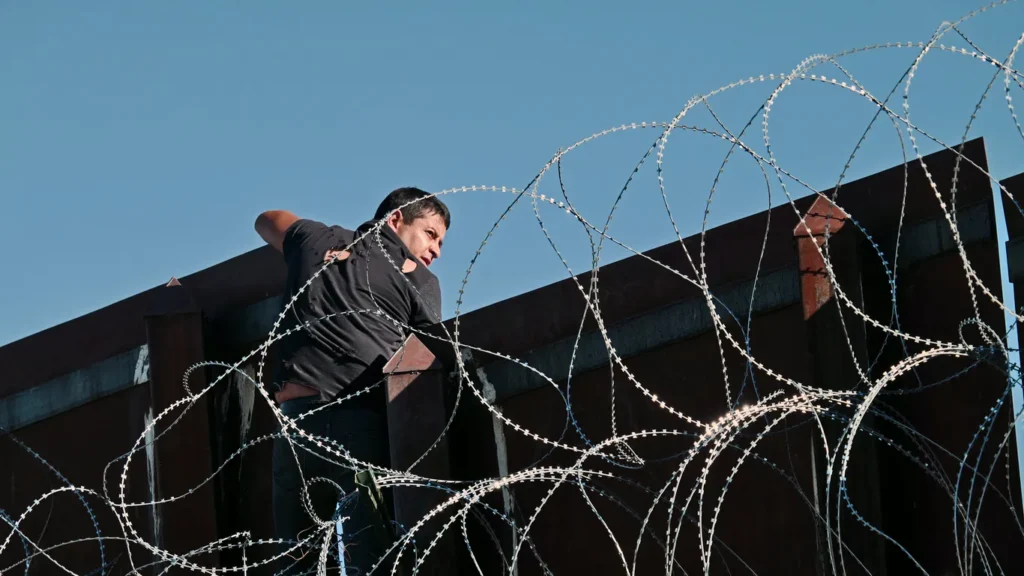The Oklahoma Congress quickly passed a bill this week creating the new crime of «impermissible occupation» and passed it to the governor to be signed into law.

Thousands of migrants have crossed the border into Eagle Pass and El Paso in recent days, the highest number since the emergency health order known as Title 42 expired in May.
OKLAHOMA CITY, Okla. (AP) — Republican-led states are rushing to give local police more powers to regulate immigration and impose criminal penalties on people living in the U.S. illegally, as the issue of migrants crossing the U.S. southern border remains a central issue for the 2024 election.
The Oklahoma Congress quickly passed a bill this week creating the new crime of «impermissible occupation» and passed it to the governor to be signed into law. The new offense carries penalties of up to two years in prison for being in the state illegally.
Oklahoma is one of several Republican-led states that are maneuvering to tighten immigration enforcement as Republicans and Democrats try to capitalize politically on the issue. That became clear in February,
when President Joe Biden and former President Donald Trump visited the U.S.-Mexico border on the same day and wrestled remotely over who is to blame for the country’s immigration control system being in such bad shape and how to fix it.
Here are some things to know about the latest initiatives in various states to address the issue of immigration:
WHAT’S HAPPENING IN TEXAS?
Oklahoma lawmakers followed the lead in Texas, where Gov. Greg Abbott signed a bill into law last year that will allow the state to arrest and deport people who enter the U.S. illegally. That law is currently on hold while the 5th U.S. Circuit Court of Appeals weighs a challenge brought by the U.S. Department of Justice.
Opponents say the law is the most drastic attempt by a state to control immigration since an Arizona law created more than a decade ago that the U.S. Supreme Court struck down parts of.

A border patrol watchman patrols both sides of the border in California. Image internet
WHAT DOES THE OKLAHOMA BILL DO?
Oklahoma law would make it illegal to stay in the state without a legal permit, and a first offense would be considered a misdemeanor and could be punished by up to a year in jail. Violators would be required to leave the state within 72 hours of their release. A second and subsequent offense would be a felony punishable by up to two years in prison.
State Senate President Pro Tem Greg Treat, who introduced the bill in the upper chamber, expressed frustration with the federal government and Congress for not taking more definitive steps to solve the immigration issue.
«The federal government has failed. The U.S. Congress… they haven’t done anything to have an impact on it,» said Treat, R-Treat. «So, what can we do? We can say you have to be in Oklahoma legally.»
Outside the state Capitol, more than 100 people gathered Tuesday to oppose the bill.
Sam Wargin Grimaldo, a 36-year-old lawyer from southern Oklahoma City whose mother emigrated from Mexico in 1979, called on protesters to register to vote and get more involved in politics.
Grimaldo said many Latinos in Oklahoma are afraid of the new law.
«We feel attacked,» said Grimaldo, who wore a T-shirt that read, «Young, Latino and proud.» «People are afraid to leave their homes if a bill like this is proposed and then passed,» he added.
WHAT ARE OTHER STATES DOING?
Tennessee Gov. Bill Lee has signed a law requiring law enforcement agencies to contact federal immigration authorities if they encounter people in the country illegally, and obliging them to cooperate in the process of identifying, detaining and deporting them. That bill goes into effect on July 1.
Another proposal in the state would increase prison sentences to life in prison for those who are in the U.S. illegally and commit a violent crime. In Iowa, Republican Gov. Kim Reynolds signed a bill into law this month that has similar parts to the Texas law. Another approach to developing a bill similar to the Texas law is moving forward in Louisiana. And Idaho lawmakers were considering a similar bill, but adjourned without passing it.
Georgia lawmakers have passed a bill that seeks to force jailers to check inmates’ immigration status, part of a political response to the murder of a nursing student on the University of Georgia campus, allegedly committed by a Venezuelan.
Last month, Florida Gov. Ron DeSantis signed a law into law aimed at increasing prison sentences for migrants who are in the U.S. illegally if they are convicted of felonies or driving without a license.
WHAT HAPPENS NOW?
Like the new Texas law, many of the bills will almost certainly face court challenges because immigration is a federal, not state, issue in the U.S. Constitution, said Kelli Stump, an Oklahoma City immigration attorney and president-elect of the American Immigration Lawyers Association.
«This whole thing is a mess and the system doesn’t work, but the Constitution says the states have to deal with state affairs and the feds handle federal affairs,» Stump said. «In the long run, this will end up before the Supreme Court, if I have to bet anything.»